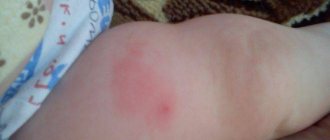The child’s immune system is imperfect, it is just being formed. The task of parents is to facilitate this process. The immune system is strengthened naturally - for this it is recommended to feed the baby breast milk for at least a year, harden it, and introduce healthy foods into the diet. In addition to the above measures, the formation of the body’s protective abilities occurs through vaccination.
The issue of immunization of children, especially babies under one year of age, is very important and should be approached seriously and thoroughly. Infections that exist in nature are very dangerous for a fragile child’s body. Whooping cough, diphtheria and tetanus are considered by some to be “childhood” diseases, although they often affect adults. It is not safe to refuse vaccinations for fear of complications. A professional vaccination procedure will help protect your child from dangerous diseases. These include diseases such as hepatitis, diphtheria, tetanus and whooping cough.
DPT and hepatitis in one vaccine is a common occurrence in medicine. Preparations that combine antigens of these diseases are developed to simplify the immunization procedure and reduce stress in the child.
Today, parents receive a lot of information about the development of negative reactions after vaccinations, which leads to doubts about the need for vaccination. Undoubtedly, this issue must be taken seriously, but if the baby is absolutely healthy and has no contraindications, the vaccine should be given. Side effects and severe complications after vaccination are rare, but the risk of infection is much higher. Whooping cough and diphtheria are quite rare today. Tetanus and hepatitis B are more common, and you can even get sick as a result of careless play. Their consequences are more dangerous than the rise in temperature after an injection.
DTP vaccination and hepatitis together - as they call it. Common vaccines
Sometimes you can hear about the DTP-hepatitis vaccination complex. DPT stands for “pertussis-diphtheria-tetanus toxoid.” This composition is often combined with a single drug against hepatitis.
The appearance of side effects is provoked by preservatives included in vaccines. To reduce the likelihood of negative consequences, special combination drugs have been developed. Thanks to them, immunity is formed against several infections at once, and the effectiveness of the joint vaccine remains high.
The name of this vaccination drug is “Adsorbed vaccine against whooping cough, diphtheria, tetanus and hepatitis B”, or “DPT-Hep B”. This is a separate vaccine, DPT-hepatitis, produced by the domestic pharmaceutical industry. It is produced in the form of a suspension for intramuscular administration. The container contains a yellowish-white homogeneous liquid, which, when standing, separates into a transparent liquid substance and a loose sediment. It breaks when shaken. One ampoule with a volume of 0.5 ml is one dose. Pharmacies sell packs of 10 vessels.
According to the immunization schedule, children should be simultaneously vaccinated against whooping cough, diphtheria, tetanus, polio and Haemophilus influenzae. A six-month-old baby should also be protected from hepatitis (in combination with the listed diseases). Doctors recommend combining all vaccinations into one to reduce the risk of complications.
Multicomponent vaccines are considered the safest and are well tolerated by children. These include:
- Infanrix – provides protection against whooping cough, diphtheria and tetanus. Unlike the domestic DTP, it is better tolerated (complications were recorded in 10% of cases). Combines perfectly with the Hiberix vaccine, designed to develop immunity against Haemophilus influenzae;
- Infanrix Hexa - includes pertussis-diphtheria-tetanus toxoid, as well as components against hepatitis, polio and Hib infection. An undoubted advantage is the content of an acellular pertussis component, thanks to which patients tolerate vaccination without problems;
- Pentaxim is a popular drug that allows you to develop immunity against whooping cough, diphtheria, tetanus, polio and Haemophilus influenzae infection. The product does not protect against hepatitis, but combines perfectly with vaccines against it in one injection;
- Tetraxim is the same drug, only without the hemophilic component.
When multicomponent vaccines cannot be used, it is necessary to choose a drug that can be combined with other agents. Immunity to hepatitis is formed due to:
- Engerix;
- Regevak-V.

Both drugs are allowed to be injected simultaneously with DPT and other vaccines.
Joint vaccination against hepatitis and DTP
The combined DTP, hepatitis and polio vaccine is often practiced by doctors to avoid infection with diseases such as polio, whooping cough, diphtheria, tetanus and some liver diseases. Another advantage of such vaccination is the protection of the liver from pathogens that are part of the DTP vaccine.
Possible complications frighten parents, which is why some of them refuse to vaccinate. But in the absence of specific contraindications, the pediatrician strongly recommends giving an injection. This is due to the fact that side effects after the procedure occur in rare cases and occur in mild forms.
While diseases caused by the hepatitis or tetanus virus lead to serious complications. It is these pathologies that are easiest for a child to become infected with in kindergarten, school and other public places.
Whooping cough and diphtheria are much more difficult to contract, but in some countries these diseases predominate over others. This applies to cities with hot climates, where the level of sanitary standards is low, and there is a possibility of infection through dirty water and household items.
Joint vaccination of DTP and hepatitis helps reduce stress in the baby. Scientists have developed special serums that reduce the risk of adverse reactions and are easily tolerated by the baby. The injection is given intramuscularly, choosing places with the least amount of adipose tissue. Typically this is the upper thigh or shoulder.
Is it possible to do DPT and hepatitis at the same time? Vaccine compatibility
DTP and hepatitis vaccination go well together; moreover, they were specially combined and administered in one syringe for convenience and to minimize side effects. The injection is given intramuscularly - in the thigh or shoulder.
On the same day with DTP, but separately, they are vaccinated against polio. The injection is given in the other leg or arm; older children receive drops orally. Negative reactions are quite rare. The vaccination is recommended for seven-year-old children as a booster vaccination before joining a new school team.
After the procedure, the health worker must fill out documentation - enter data about the drug into the medical record, make a note about the body’s subsequent reaction.
Indications for vaccination
The formation of a protective mechanism in childhood occurs due to the influence of several factors, including:
Breast-feeding
- breast-feeding;
- timely immunization;
- healthy eating;
- hardening.
The DTP + hepatitis vaccine contains weakened viruses and bacteria. After they enter the body, the immune system is activated, resulting in the production of antibodies. Thanks to this, the child will be protected in the future from changes caused by whooping cough, hepatitis B, and diphtheria. The simultaneous use of several vaccines is not prohibited; if the instructions for use are followed, the risk of complications is minimal. Immunization with DTP must be carried out for every child (provided that there are no contraindications).
The decision to carry out the procedure is made by the parents and the attending physician. In any case, a pharmacological product has pros and cons. Thanks to the combined administration of DTP and hepatitis vaccination, immunization is greatly simplified. To avoid negative consequences, it is necessary to carry out the preparatory stage.
DTP combined with a drug for hepatitis is a remedy that can prevent the occurrence of serious diseases. Compound vaccines are allowed even for infants. If the likelihood of infection is significantly increased, emergency vaccination is carried out. In this case, the administration of the drug DTP + hepatitis occurs on the 7th day after the birth of the child, at 3 weeks, upon reaching one year. Injections are strictly prohibited from being placed into adipose tissue.
Purpose of immunization
Diphtheria, tetanus, whooping cough, hepatitis B are terrible infections that, according to statistics, in 70 percent of cases lead to disability or death. If a person has not been vaccinated, he runs the risk of becoming infected. Viruses are dangerous for both children and adults. The purpose of immunization is to protect people from these diseases. For this purpose, DTP and hepatitis are administered simultaneously.

Contraindications to joint vaccination against hepatitis and DTP
Not all patients can be given DTP and hepatitis together in one injection. Vaccination is not permitted when the child has at least one of the following symptoms:
- increased body temperature (even slight);
- history of seizures;
- presence of snot and congestion;
- weakened immunity;
- neurological disorders;
- head injuries during childbirth;
- acute infections, respiratory diseases;
- chronic diseases in the acute stage;
- oncology;
- taking immunosuppressants;
- allergies (especially to yeast);
- negative reactions to a previous vaccination;
- constipation during the day before the procedure;
- meningitis;
- diathesis;
- atopic dermatitis.
Immunization of a child is delayed if he was born prematurely. It will be rescheduled until the baby’s condition returns to normal. The vaccine is not given when the baby's baby teeth are cutting and the temperature rises.
As for adults, immunization is not carried out during pregnancy and breastfeeding.
Preparing for vaccination
Proper preparation for vaccination will help avoid unwanted consequences.
The rules are as follows.
- Several weeks before the planned procedure, you should avoid public places to avoid contracting an infection.
- If you are prone to allergies, start taking antihistamines a few days before vaccination.
- Do not overeat, do not include new foods in your diet.
- Take blood and urine tests.
- Take an antipyretic immediately before the injection.
- Do not take vitamin D three to four days before and after the procedure.
The most important rule is that the child must be examined by a pediatrician, who will decide whether the vaccine can be given or not.
Preparatory stage
Antihistamines
A lot depends on following the specialist’s recommendations at this stage. Parents should keep their child away from public places for several weeks before the procedure. This is due to a decrease in immunity after vaccination with DTP + hepatitis. Due to the weakening of the protective function, the baby’s body will not be able to fight pathogens. If a child suffers from allergies, the doctor prescribes a course of antihistamines. It takes 2-3 days before the injection and several days after it. There is no need to take medication on the day on which the procedure is scheduled.
It is also not recommended to introduce new foods into the diet. A healthy diet, daily walks in the fresh air, and taking vitamin and mineral complexes (the only limitation is calciferols) will help you endure vaccination without negative consequences.
Mandatory activities during the preparatory period include undergoing a medical examination. You should visit a pediatrician and neurologist and get tested. If health problems are identified, the administration of the vaccine is postponed. It’s better to be safe than to worry about your child later. Immediately before the procedure, the patient should be given a medicine that has antipyretic and analgesic effects.
Through DTP + hepatitis vaccination, a child develops immunity to whooping cough, diphtheria, hepatitis B, without causing unnecessary stress on vital organs. Among the most effective combined DTP vaccines are Infanrix, Hiberix, Pentaxim, Tetraxim. They are allowed to be combined with mono-vaccines against polio (Imovax Polio, Poliorix) and hepatitis B (Engerix, Regevak B). Infarix Hexa can be classified as a separate group. By giving preference to it, parents protect the baby from 6 serious diseases at once: whooping cough, hemophilus influenzae infection, tetanus, hepatitis B, diphtheria, polio.
Imovax Polio
The choice is made taking into account the cost, effectiveness, valency, and reactogenicity of the drug. The lower the last indicator, the less likely it is to develop side effects. The quality of the DTP vaccine also depends on compliance with the required standards during its transportation and storage.
Vaccination scheme
The vaccination schedule was established by the Russian Ministry of Health.
The hepatitis vaccine is given in the first hours after birth. At three months they give DPT and anti-hepatitis injections, then repeat them at six months.

If the child is not vaccinated before three months, then the scheme is as follows – 3 – 4.5 – 6 months. The interval between injections can be increased by a maximum of six months, since otherwise antibodies will not be produced. DTP and hepatitis can be postponed if the patient is sick, but not for long.
If the patient has received one or two DPT vaccinations without hepatitis, the third one can be given a combined one, and an additional vaccination against hepatitis one and six months after the first injection.
What to do after vaccination
After DTP, it is recommended to adhere to the following rules:
- stay in a medical facility for half an hour after the vaccine is administered to get help in case of negative reactions;
- monitor the temperature;
- ventilate the room where the child is located, control air humidity;
- give the baby more fluids;
- do not eat fried or salty foods;
- create a calm environment;
- do not visit places with large crowds of people.
If acute reactions occur, immediately seek qualified help.
Side effects and possible complications from joint vaccination of DTP and hepatitis
Often, side effects occur due to the incoming pertussis toxoid, so in certain cases the vaccination is carried out without the pertussis pathogen component. All side effects vary in severity.
Mild side effects include the following symptoms:
- low-grade fever;
- weakness and feeling of fatigue;
- slight sweating;
- redness of the skin and slight swelling;
- loss of appetite;
- small accumulations of pus at the injection site, which arise due to non-compliance with hygiene standards.

This symptomatology indicates that the body is resisting viral cells. After a few days, all mild side effects go away on their own, so there is no need to worry about the child’s health and use medications to relieve symptoms.
The exception is high temperature, which exceeds 38.4°C. In such cases, you should consult a doctor to prescribe an antipyretic drug.
In rare cases, complications of a more serious nature occur, so the child remains under the supervision of a doctor for some time.
The main complications that appear after vaccination include:
- increase in body temperature to 39-40°C;
- redness of the area around the injection site is greater than the specified norm;
- the appearance of a small compaction that can be felt upon palpation;
- the baby periodically experiences diarrhea and the urge to vomit;
- the area where the vaccination was carried out begins to swell.
As soon as a newborn has one of the above symptoms, parents should immediately contact a pediatrician or call an ambulance. In this case, the child is prescribed antipyretic syrups or suppositories and local antihistamine ointments.
The most serious complications include severe skin rashes, urticaria, Quincke's edema and asthma attacks.
Observation after vaccination
After vaccination, the baby should be monitored in order to identify possible complications in time. Be sure to monitor your body temperature. Since swelling may form at the injection site, the child must be supervised so that he does not touch or scratch it. This will help avoid local reactions.
In the first couple of days, you should not bathe your baby, so as not to introduce an infection into the resulting wound. You can go for a walk if the child feels well. The DPT and hepatitis vaccination is tolerated without complications in 92% of cases.

Diet control is also important. You should not offer your baby complementary foods or any unfamiliar foods.











